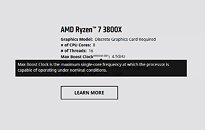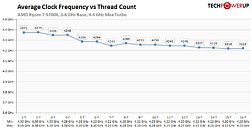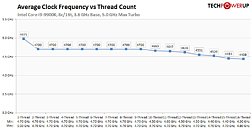Monday, August 12th 2019

AMD Updates Ryzen Product Pages to Elaborate on "Max Boost Clocks"
AMD over the weekend updated the product-pages of its Ryzen processors on the company website to be very specific about what they mean by "Max Boost Clocks," that are advertised almost as extensively as the processor's main nominal clock-speeds. AMD describes it has "the maximum single-core frequency at which the processor is capable of operating under nominal conditions." We read into this as the highest boost-clock given to one of the cores on the processor.
If you've been reading the "clock-frequency and boost analysis" charts in our processor reviews, you'll know that AMD processors spread their boost frequency progressively across cores during a multi-threaded workload that scales across all cores. At any given time, only one of the cores is awarded the highest boost clock, and while the other cores too get boosted beyond the nominal clock-speeds, they are in slight decrements of 25-50 MHz. The graph below is from our Ryzen 7 3700X review. The second graph below is from our Core i9-9900K review, which too shows only one of the cores getting the max boost frequency, and the remaining cores getting lower boost clocks, although the graph looks flatter.
Source:
squidz0rz (Reddit)
If you've been reading the "clock-frequency and boost analysis" charts in our processor reviews, you'll know that AMD processors spread their boost frequency progressively across cores during a multi-threaded workload that scales across all cores. At any given time, only one of the cores is awarded the highest boost clock, and while the other cores too get boosted beyond the nominal clock-speeds, they are in slight decrements of 25-50 MHz. The graph below is from our Ryzen 7 3700X review. The second graph below is from our Core i9-9900K review, which too shows only one of the cores getting the max boost frequency, and the remaining cores getting lower boost clocks, although the graph looks flatter.



134 Comments on AMD Updates Ryzen Product Pages to Elaborate on "Max Boost Clocks"
Intel 'looks flatter' ... with a 500mhz frequency gap versus AMD's 150 mhz.Good point, because if they advertise 4.4 Ghz and hit 4375, that is really under :D
I'll still take XFR any day of the week though...
I have a feeling this is going to backfire badly.
Also, what's nominal conditions?
At this point, I really feel AMD cheated me out of extra money for nothing.
This doesn't even start to take their PBO video into account, where they claim we could expect an extra 200MHz boost as long as the motherboard could deliver more power.
A lot of people don't achieve anything near with single core load (like Cinebench single core, SuperPi single core...) , and processor only boosts close to stated boost speed with very light single core loads for a very short periods of time.
Should the processors be able to sustain boost clock with single core load, proper motherboard and enough cooling? Or does hovering near for a milisecond in idle count as achieving stated frequency, don't look at frequencies during load?
Will AMD also disclose what happened to the PBO + Overclock, and rasing boost clocks up to 200 MHz with good enough motherboard and cooling? Or is that a forgotten marketing push that wasn't really based on anything achievable?
the graph shows 16 threads 4,2Ghz-4,25ghz.
if this would be right you would see much more higher scores at auto clock.
when I manually OC to 4,2Ghz all core the scores are higher then auto.
Only CCX0 and CCX1 are good enough to reach 4.6Ghz.
Also funny that people thought a 12 core cpu would reach 4.6Ghz on all cores...
The clocks are all over the place and this is why people are upset...I never expected that, as it was boost speed. However, I do think people expected a more consistent behaviour, as it's really quite different from CPU to CPU, not by 25-50MHz, but by 200-300MHz in some cases.
That would indeed be some Fine Wine.
AMD has to say sooner or later what are the real specifications of Ryzen 3000 processors, and if those promisses were simply false advertising.
it's nice xfr works better than turbo boost,but still zen 2 overclocks like a turd compared to intel's ridiculed 14++++++++++++
even the games a 9900k beats 3700x in at 1440p, its only by 5 fps or so a lot of the times. and at 4k its tied.
That doesn't detract from Zen's value per se, but it looks like it unnecessarily exposes AMD to a class action lawsuit (we all know there's a lawyer somewhere with some time to kill).
when you compare mostly gpu-bound scenarios then even a 9400f will match 3700x so those kind of comparisons aren't really going anywhere.